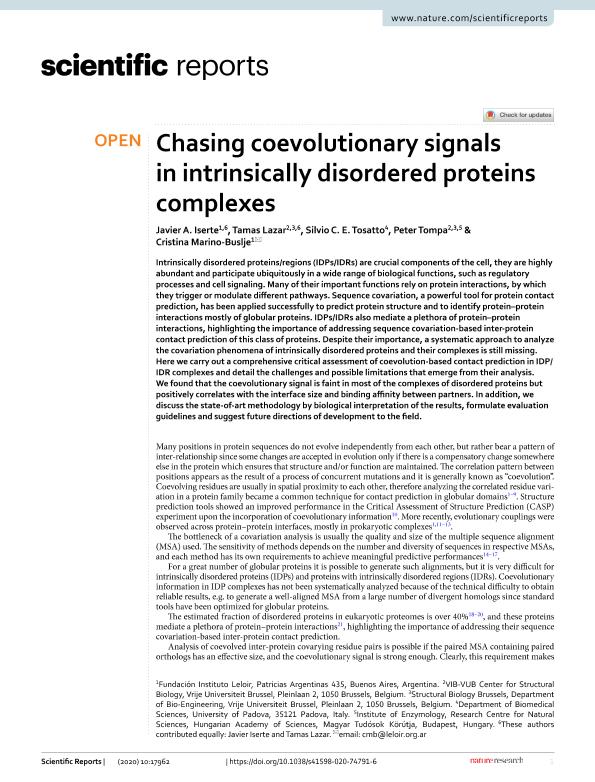Mostrar el registro sencillo del ítem
dc.contributor.author
Iserte, Javier Alonso

dc.contributor.author
Lazar, Tamas
dc.contributor.author
Tosatto, Silvio C. E.
dc.contributor.author
Tompa, Peter
dc.contributor.author
Marino, Cristina Ester

dc.date.available
2021-08-24T12:26:50Z
dc.date.issued
2020-10
dc.identifier.citation
Iserte, Javier Alonso; Lazar, Tamas; Tosatto, Silvio C. E.; Tompa, Peter; Marino, Cristina Ester; Chasing coevolutionary signals in intrinsically disordered proteins complexes; Nature; Scientific Reports; 10; 1; 10-2020; 1-9
dc.identifier.issn
2045-2322
dc.identifier.uri
http://hdl.handle.net/11336/138746
dc.description.abstract
Intrinsically disordered proteins/regions (IDPs/IDRs) are crucial components of the cell, they are highly abundant and participate ubiquitously in a wide range of biological functions, such as regulatory processes and cell signaling. Many of their important functions rely on protein interactions, by which they trigger or modulate different pathways. Sequence covariation, a powerful tool for protein contact prediction, has been applied successfully to predict protein structure and to identify protein–protein interactions mostly of globular proteins. IDPs/IDRs also mediate a plethora of protein–protein interactions, highlighting the importance of addressing sequence covariation-based inter-protein contact prediction of this class of proteins. Despite their importance, a systematic approach to analyze the covariation phenomena of intrinsically disordered proteins and their complexes is still missing. Here we carry out a comprehensive critical assessment of coevolution-based contact prediction in IDP/IDR complexes and detail the challenges and possible limitations that emerge from their analysis. We found that the coevolutionary signal is faint in most of the complexes of disordered proteins but positively correlates with the interface size and binding affinity between partners. In addition, we discuss the state-of-art methodology by biological interpretation of the results, formulate evaluation guidelines and suggest future directions of development to the field.
dc.format
application/pdf
dc.language.iso
eng
dc.publisher
Nature

dc.rights
info:eu-repo/semantics/openAccess
dc.rights.uri
https://creativecommons.org/licenses/by-nc-sa/2.5/ar/
dc.subject
Intrinsically disordered proteins
dc.subject
Protein-protein interactions
dc.subject
coevolution
dc.subject
protein complexes
dc.subject.classification
Otras Ciencias Naturales y Exactas

dc.subject.classification
Otras Ciencias Naturales y Exactas

dc.subject.classification
CIENCIAS NATURALES Y EXACTAS

dc.title
Chasing coevolutionary signals in intrinsically disordered proteins complexes
dc.type
info:eu-repo/semantics/article
dc.type
info:ar-repo/semantics/artículo
dc.type
info:eu-repo/semantics/publishedVersion
dc.date.updated
2021-08-20T19:41:11Z
dc.journal.volume
10
dc.journal.number
1
dc.journal.pagination
1-9
dc.journal.pais
Reino Unido

dc.journal.ciudad
London
dc.description.fil
Fil: Iserte, Javier Alonso. Consejo Nacional de Investigaciones Científicas y Técnicas. Oficina de Coordinación Administrativa Parque Centenario. Instituto de Investigaciones Bioquímicas de Buenos Aires. Fundación Instituto Leloir. Instituto de Investigaciones Bioquímicas de Buenos Aires; Argentina
dc.description.fil
Fil: Lazar, Tamas. Vrije Unviversiteit Brussel; Bélgica
dc.description.fil
Fil: Tosatto, Silvio C. E.. Università di Padova; Italia
dc.description.fil
Fil: Tompa, Peter. Vrije Unviversiteit Brussel; Bélgica
dc.description.fil
Fil: Marino, Cristina Ester. Consejo Nacional de Investigaciones Científicas y Técnicas. Oficina de Coordinación Administrativa Parque Centenario. Instituto de Investigaciones Bioquímicas de Buenos Aires. Fundación Instituto Leloir. Instituto de Investigaciones Bioquímicas de Buenos Aires; Argentina
dc.journal.title
Scientific Reports
dc.relation.alternativeid
info:eu-repo/semantics/altIdentifier/url/http://www.nature.com/articles/s41598-020-74791-6
dc.relation.alternativeid
info:eu-repo/semantics/altIdentifier/doi/http://dx.doi.org/10.1038/s41598-020-74791-6
Archivos asociados
